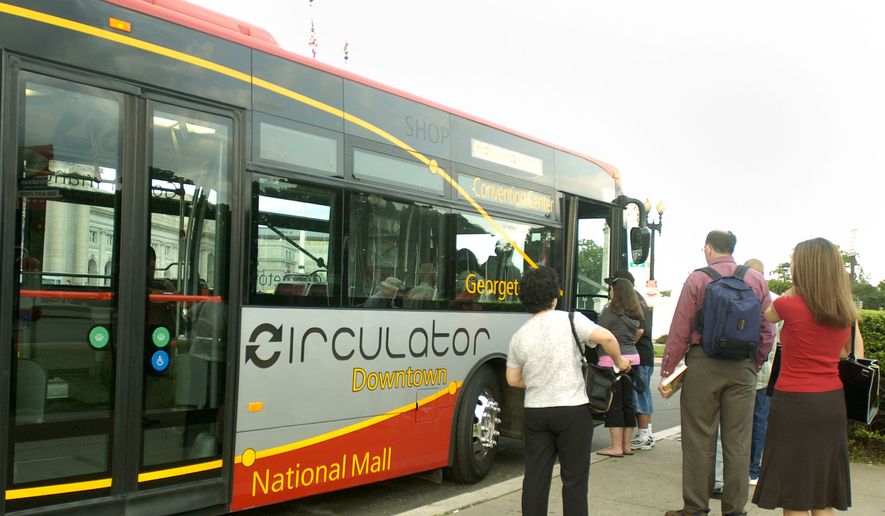The DC Circulator is set to get a new service operator, but the new boss might not be around for long.
The D.C. Council voted on Tuesday to approve the 5-year, $21 million contract, following a lengthy bidding process to find a new company to run the intra-city bus service. The new company, RATP Dev, currently manages the DC Streetcar system and agreed to several protections to protect workers, but some lawmakers are still hoping to remove private companies from the picture altogether.
“In the future, I hope to bring the Circulator into the government,” said committee chair and Ward 3 councilmember Mary Cheh in an interview on Wednesday.
The councilmember joins union officials who have long called for an end to the public-private partnership that manages the Circulator, and for the bus service to be moved “in-house” as part of the D.C. Department of Transportation (DDOT).
“The riders that we talk to, the workers we represent, want a publicly accountable system and that means a publicly operated one,” said Todd Brogan, an organizer for the Amalgamated Transit Union (ATU). The 200 bus drivers and mechanics employed by the DC Circulator are represented by ATU Local 1764.
Other cities nationwide have followed that model, but DDOT previously stated it could take another year before it was ready to manage the operations, and it could cost the city $6 million annually.
The goal of taking over the DC Circulator, which is currently jointly run by DDOT and private company First Transit, was frustrated by this latest new contract.
DDOT picked RATP Dev as the new provider in early June, leaving the council barely a month to hold a hearing and vote on the contract before the legislative body breaks for the summer. Rejecting the deal might have meant the bus service could be suspended after First Transit’s contract expires on June 30, a tight deadline Ms. Cheh called “frustrating.”
She approved the contract after RATP Dev pledged to uphold the jobs and benefits standards and to honor the collective bargaining agreement.
RATP Dev president Blaine Rigler, in a letter to Ms. Cheh last week, wrote, “During my time with RATP Dev, we have been fortunate to win a number of opportunities. In each and every case we have honored these items as I have outlined and we intend to do so here.”
But Ms. Cheh said in the interview Wednesday, “I’m a lawyer. I like to say, ’But where it is written?’”
The letter, she noted, is not part of the official DDOT contract but may help the District pursue a case against RATP Dev if the company violates existing labor deals in the future , she said.
“We’re happy the council held its ground,” said Mr. Brogan. “We’re not happy that the mayor and DDOT made no effort to assist with this.”
Mayor Muriel Bowser did not respond to a request for comment in time for publication.
The District can break the service contract at any time over the next five years if it decides to give control over the Circulator to DDOT, but will be force d to pay RATP Dev for the lost business. Ms. Cheh, ATU, and DDOT said they will be awaiting the results of a yearlong study on a city takeover which began this April before making any moves to break the contract.
“Our focus is on delivering a safe and reliable service for residents, visitors and employees who work on the system,” DDOT spokesperson Terry Owens told The Washington Times in an email, adding that the department was “grateful” for the council approving the new contract and that DDOT looked “forward to assuming direct management of the DC Circulator system.”
The ATU is especially wary of RATP Dev, which manages DC Streetcar, because the company fired seven DC Streetcar employees in 2015 after they signed union petitions. “We still don’t have any indication that this contractor is going to be any better,” said Mr. Brogan.
City transportation officials began seeking a new service operator in October after current operator First Transit failed to meet the 80 percent on-time performance requirements. The bus system has been plagued by low ridership and frequent vehicle breakdowns in recent years, with 2017 having the lowest on-time performance rates since 2012, according to department data.
DDOT has since begun swapping out old vehicles for new electric ones with a plan to replace the 35 oldest buses in the fleet by the end of 2018. Officials have also altered bus routes in the hopes of increasing ridership, including adding back a route in Southwest in time for the slew of summer sports events and festivals.
• Julia Airey can be reached at jairey@washingtontimes.com.




Please read our comment policy before commenting.